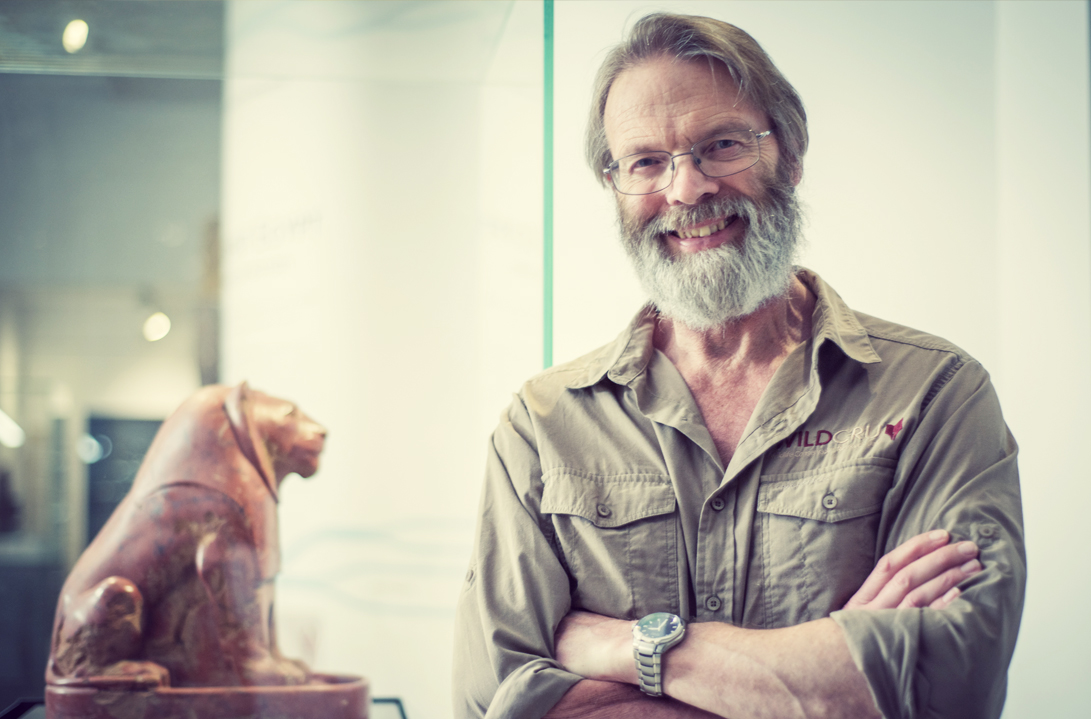
WildCRU Founder and Professor of Wildlife Conservation
Professor David Macdonald
Professor of Wildlife Conservation | Founding Director of WildCRU | Wildlife Research Fellow at Lady Margaret Hall
PROFILE
David Macdonald CBE is Professor of Wildlife Conservation and the Founding Director of WildCRU. His Fellowship, held at Oxford’s Lady Margaret Hall since 1986, was the first in any university dedicated to research in Biological Conservation. David is both an accomplished leader in conservation science and research and one of the most prominent international figures in raising public awareness of the importance of biodiversity, populating biology through his films and books.
From his early career on the behavioural ecology of foxes and badgers he developed his mission to achieve practical solutions to conservation problems through original scientific research. He is well known for his work on big cats, including lions, tigers, leopards and especially clouded leopards, although his research has spanned published studies on moths to penguins. David was an early advocate of engaging with local communities to ensure long-term conservation success. Within the WildCRU, his teams have built bridges with some of the most remote communities in Africa, Asia and South America, and have formed conservation partnerships which benefit both the people and the wildlife with which they coexist. David has supervised more than 160 successful Oxford doctoral students and he created the Recanati-Kaplan Centre’s Postgraduate Diploma in International Wildlife Conservation Practice to train aspiring conservationists from less developed countries, receiving the Queen’s Award for Higher Education in 2011.
He engages fully with policy issues, preparing scientific reports to inform policy on topics ranging from the conservation of Scottish wildcats to the control of invasive American mink. He has been a prominent figure in the debate around the involvement of badgers in the transmission of bovine tuberculosis (bTB) in cattle in the UK, and attempts to control the disease by killing badgers, which has been among the most controversial issues in wildlife disease management globally.
David was linked to two of the most notable wildlife stories in recent history – Cecil the lion in 2015 and COVID 19 outbreaks in 2021. In both cases he and his colleagues had previously gathered data on the animals involved: the individual bow hunted lion and the wildlife in Wuhan Wet Markets.
David has a strong record of public service, having been on the Board of almost every major UK conservation body – WWF, FFI, ZSL (Vice President), WWT, RSPB, RSPCA (Vice President), the Wildlife Trusts (Vice President) and Chairman of Earthwatch, now Earthwatch Chair Emeritus UK. Internationally he served as an advisor to the School of Wildlife Conservation at the African Leadership University. In the UK, having been on the Boards successively of English Nature and Natural England, he was the founding Chairman of Natural England’s Science Advisory Committee and was the Chairman of the UK’s government Darwin Initiative for a decade. He is an Emeritus Fellow of the IUCNs Survival Commission having served as the founding Chairman of the IUCN/SSC Canid Specialist Group for 25 years. Currently he is a Trustee of Chester Zoo and Chairman of Action for Conservation. He is a board member of Lion Landscapes and the Local Nature Partnership for Oxfordshire .
David holds a DPhil and DSc from Oxford and is an elected Fellow of the Royal Society of Edinburgh (FRSE). He has published approximately 2000 peer-reviewed papers and book chapters. His H-Index is 128. His research has become increasingly inter-disciplinary as the whole field of conservation has evolved. More recently his biological writings are enmeshed in issues of environmental policy, economics, ethics and research strategy.
SELECTED PUBLICATIONS
Full publication list here.
Mitigating human impacts on wild animal welfare
Trading Animal Lives: Ten Tricky Issues on the Road to Protecting Commodified Wild Animals
Mammal Conservation: Old Problems, New Perspectives, Transdisciplinarity, and the Coming of Age of Conservation Geopolitics
Towards a More Natural Governance of Earth’s Biodiversity and Resources
Monogamy: Cause, Consequence, or Corollary of Success in Wild Canids
Patchwork planet: the resource dispersion hypothesis, society, and the ecology of life
Mitigating human impacts on wild animal welfare
Human activities negatively impact the welfare of wild vertebrates in many different contexts globally, and countless individual animals are affected. Growing concern for wild animal welfare, especially in relation to conservation, is evident. While research on wild animal welfare lags behind that focused on captive animals, minimising human-induced harm to wild animals is a key principle. This study examines examples of negative anthropogenic impacts on wild animal welfare, how these may be mitigated and what further research is required, including examples from wildlife management, biodiversity conservation, wildlife tourism and wildlife trade. Further, it discusses the relationship between animal welfare and biodiversity conservation, and synergies that may be achieved between these. Ultimately, it is discussed how the welfare of wild animals may be balanced with other priorities to ensure that welfare is afforded due consideration in interactions between people and wildlife.